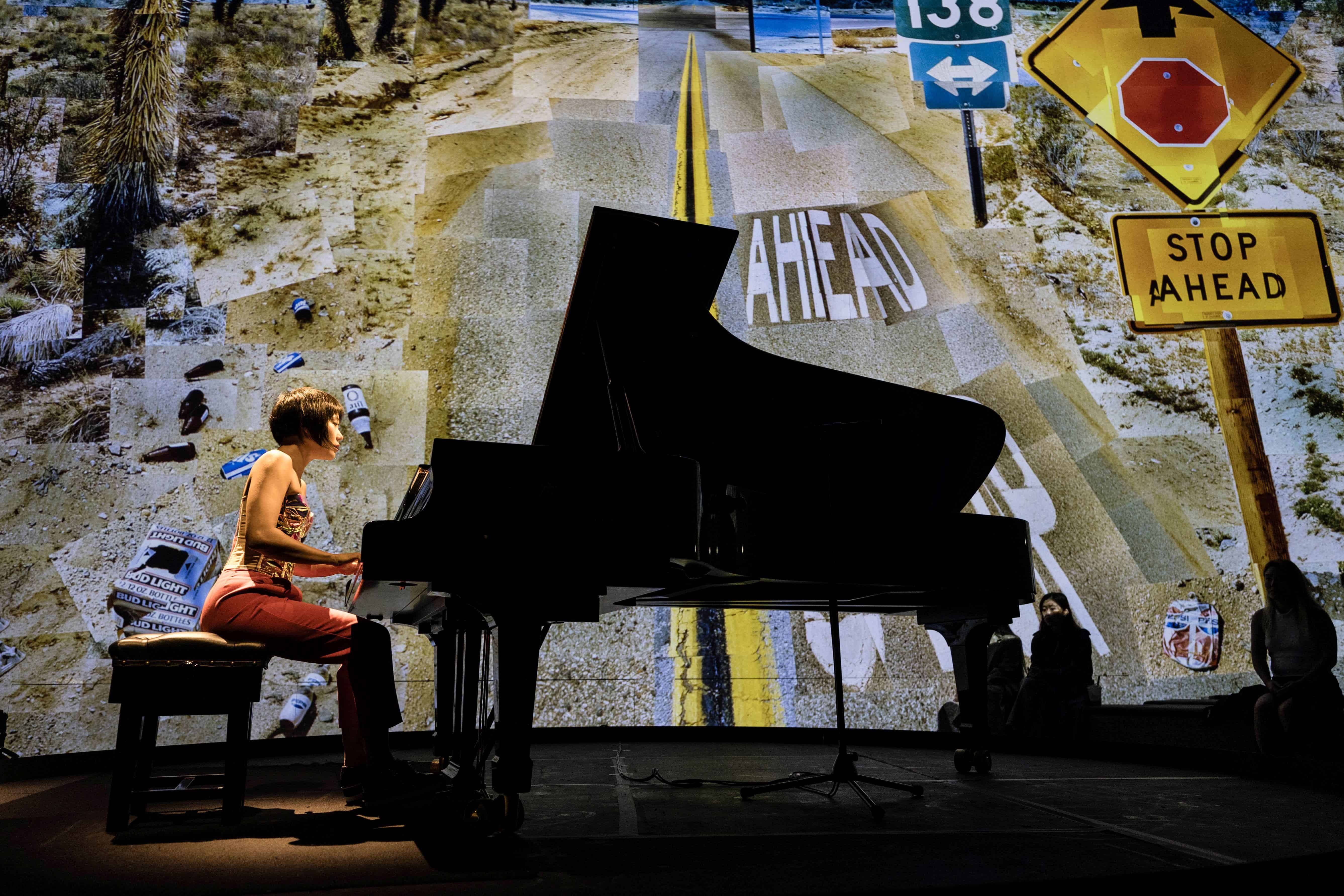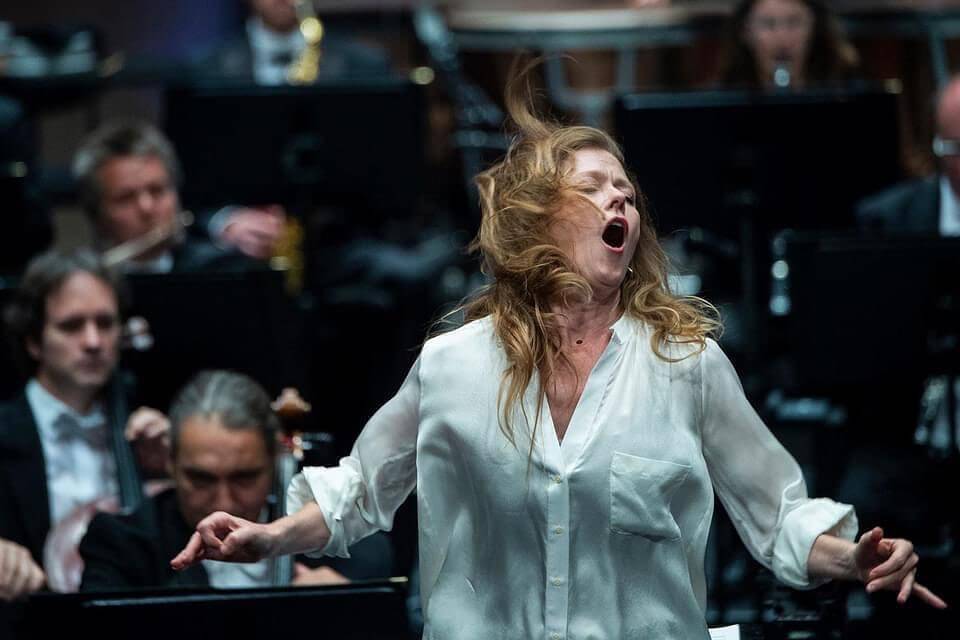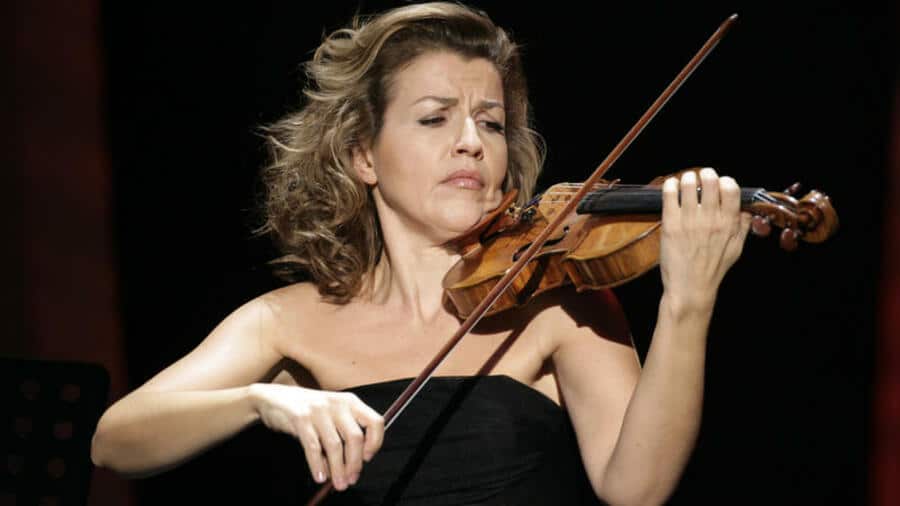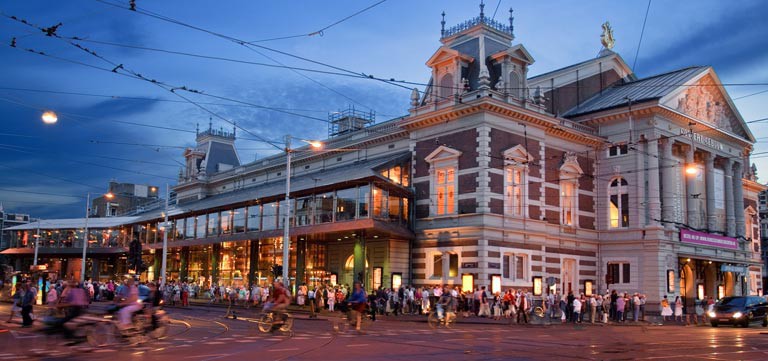Sorry, Yuja. This has to come out
NewsFrom my new essay in The Critic, out today:
Possibly the last thing I expected to run into in this life was Yuja Wang playing Pierre Boulez at a David Hockney exhibition in a box-room behind London’s Eurostar terminal.
The incongruities are so fantastically disparate they defeat the act of criticism, which is helpful since the organisers made us sign a prior undertaking not to review the event. It was, they said, an experiment by the Chinese-US pianist, her repertoire decisions were spontaneous and the video elements might be controversial.
All of these arguments struck me as perfectly reasonable and I had no problem at all signing-up to the review ban. Up to the midpoint, that is, when I felt that what I was witnessing in the King’s Cross Lightroom might actually be the future of concerts for the rest of the century. And if that were so, I would be professionally obligated to share the event with history (sorry, Yuja)….
Read on here.






“why can’t all solo recitals be like this? Why won’t Carnegie Hall enhance its pianists with works of Pissaro or Picasso from the Metropolitan Museum? And why can’t we have live video close-ups of hands, face, hairstyle and legs in the recapitulation section of every over-long sonata?”
Because we are adults and not 13 year-old boys with Attention Deficit Disorder.
Pissaro? Sounds like an interesting performance artist! (Or wait – could it be another NL typo – but surely not.)
Camille Pissaro is one of the painters that represent impressionism. His works can be seen displayed in various prestigious museums, including the Orsay.
… with two ‘r’s!
Well said…
Hey, as the article says, if you’re that resistant to new concepts, you can still attend with devoutly shut eyes.
I’m glad to see Yuja doing this. I just hope it moves past experiment stage and becomes more the norm.
Sounds like an incredible experience. I’m not sure why you belittle and refuse to acknowledge and Yuja’s artistic genius though, making this concert out to be a whim or flight of fancy rather than a long-planned out experiment by an extremely intelligent and savvy performer? You may not mean to, but I don’t think you would have used the same language if it were Trifonov or Andsnes…
“Artistic genius” = marketing skill
Alice Sara Ott is doing a extensive recital tour to Japan, China this season, with a digital video installation in collaboration with architect Hakan Demirel, featuring Chopin, Arvo Part, Gyorgy Ligeti, Francesco Tristano and others. It’s coming
This is not a revolution — it is a marketing gimmick for people who don’t have ears and/or who don’t plan to develop any. This might well sound “elitist,” but in my opinion the last thing classical music needs today is being diluted with images, as the end result would be music becoming a mere afterthought — a mere accompaniment to images. Not that the idea is bad altogether — reading your review, I would have been curious to attend this performance, as I do believe that the juxtaposition of certain musical works with Hockney’s art might work quite well and might be rather enjoyable. But I can’t agree with the idea that this should become a new model or avenue for attracting audiences. It might, but if so it would be for the wrong reasons. We already inhabit a culture in which vision has a hegemony over every other sense — we are surrounded by screens, which accompany us everywhere and which condition us continuously toward a state of numbness, if not full-fledged zombification. The point of music is precisely to listen, but also to learn how to listen, which requires effort. And that’s the crux of the matter. I very much suspect that making this a new normal would only degrade further this very ability, as it would further compromise our capacity for focus. It would also alter the concert experience by making performers secondary, and part of a performance is not merely the actual end result, but also the rapport of any given performer with the work being performed, which can literally be seen. In this sense, it is also visual — albeit in a radically different way from an immersion within images. This idea of immersion, which is quite in vogue today, also degrades the listener/spectator as it fosters a sense of complete passivity, whereas in the concert experience a spectator is also an active participant in their own way. It is equal to the radical difference between going to a museum vs. going to one of these “immersion” shows which are popping up everywhere and which radically alter the spectator’s very relationship to a work of art, turning it into a “relaxing” experience where any chance of developing an artistic point of view is simply obliterated. In other words, it is a promotion of the lowest common denominator, which works quite well for market purposes.
Very well written, and a great counter point to Norman’s article. My question is, how do you think we can foster such focus, especially for classical music? It is no secret that this industry is shrinking, and it is partly due to the elitism, inaccessibility, rigidness, and precisely the kind of effort that it requires from the audience that turns them off (even the fact that they have to stay still in the dark in silence, and not clap in between movements can feel very oppressive to some). Surely, saying that nothing needs to change and that the audience just needs to learn better, is not a good response. If they do need to learn better, then how can we help them? Something does need to change if we want this industry to work in the long term.
When music in schools was underfunded and taking children to concerts was stopped, it was the begining of the end. In the 6th grade, in Calif., all the 6th graders could sign up to go the Shrine auditorium in downtown L.A. and see Madame Butterfly. The auditorium was packed and the performance was stunning. That made me a lifetime opera listener. Those days are long gone. Whatever has to be done to encourage people to attend live music performances it is worthwhile.
That is great to hear! Such outreach programs should definitely be encouraged and funded. Thanks for your thoughts
I doubt that the elitism and rigidness you’re describing is the main reason why younger audiences are not attracted to classical music. It may play a tiny role, but the reality is that younger people no longer have any exposure to classical music through means such as musical education and television and radio programs — all of which are slowly disappearing in many countries around the world. You can’t grow to appreciate something you don’t have any exposure to. On top of that, classical music in today’s culture is a niche market that is often associated by young people as something passé that is no longer relevant to today’s world. I actually this obsession with staying abreast with the latest and the most fashionable leads younger people to dismiss the past in general, not just when it comes to classical music, and it is this very dismissal that may be at play here. I don’t believe any sort of externals will make any significant difference. They may temporarily rouse interest as an object of curiosity, but even making each classical concert a multimedia experience, or abandoning each and every code of the concert experience won’t create lasting audiences. I do believe classical music will become an increasingly shrinking market that may still appeal to a rare few but that will probably struggle financially — which is exactly why it may do better in countries where there still are subsidies for the arts, as it won’t depend on sales. In other countries, such as the US, I believe only major organizations in major cities — because of a strong donor base that will ensure that its main cultural outlets remain sustainable — may well thrive, while smaller venues may struggle to survive.
Yes I agree that exposure makes all the difference, and your conclusion that it will survive better where classical music is subsidized and protected makes sense. However, what exactly is to be preserved and continued, is the question. Concert experience during Bach’s time, Chopin’s time, Wagner’s time, and our contemporary times are all very different. I know Martha Argerich, for example, has consciously been programming her concerts with mixed instrumentation in the style of salon concerts of the 19th century. People also make a fuss about how certain musicians dress, but looks and charisma were an integral part of Liszt’s appeal, for example. As much as I relate to your sincerity of wanting to purely appreciate music for what it is, and to not vulgarize the concert going experience, I think concerts always existed in context, and music appreciation depends a lot on external factors.
I’ve also spoken to quite a few young people, and here in Europe, at least, there is definitely the image that classical music is for the bourgeois/old money elites. They tell me that it is too solemn and rigid (an opinion Martha Argerich also shares..), and it doesn’t feel relevant to their lives. I don’t think it’s so much about new vs old per se, as it is about how relevant it really feels. I think we do need to make more efforts to show why Chopin is still relevant today. It’s harder to do so due to the image of classical music, as well as the effort it takes to listen to it. Rap/pop that literally have strong messages about our current issues are more advantageous by design in this regard. Anyways, thanks for your thoughts (you are very eloquent!) and the opportunity to discuss and think about this!
Thank you for your reply — I enjoyed the dialogue as well. I would just add that this notion of what is “relevant” is actually much more problematic and much less obvious than it sounds. The way it is commonly used, it sounds like it refers to what concerns people specifically for our time, here and now. But that’s precisely the point. If we stuck merely to what concerns us immediately in the here and now, we would simply have to dismiss most of Western culture. After all, Plato, Shakespeare, Kant, Leonardo da Vinci — how relevant are they today, at least in the sense this notion of relevance is commonly used? They actually are relevant more than ever, but here too it takes exposure — and work — to become aware of it.
The crux of this issue has to do with expediency and with the notion of effort vs. what is easy and accessible. When we stick merely to what is immediately gratifying, we might miss out on what is most important, and in this sense most relevant. And in an era when everything is expected to happen right away, as we are on “internet mode,” so to speak, the notion that one would have to be challenged and make an effort to approach something that is not immediately intelligible nor enjoyable for us is definitely antithetic to today’s culture. Ultimately, this is a question of widening one’s perspective vs. remaining enclosed in one’s insular bubble, which I’m afraid defines today’s age.
I completely agree! I think you hit the nail on zooming in on “relevance”. We really should widen the meaning of “relevance”. In fact, this is at the heart of polarization as well. Despite us all having more in common than the differences, we tend to fixate on what we feel is the most “relevant” to our identity, and reject others that we feel do not live up to it. Appreciation of classical music is indeed something that happens through active listening and making the effort to connect with the unfamiliar. I think this is an approach that we should try to foster, not just in regards to classical music, but in every aspect of our collective life. Everyone/every idea is more relevant to our lives than we think. In that sense, perhaps performances like this by Yuja could be part of this process, if done right? If it’s done just to attract attention, or to relegate music to the background, then I agree that it’s not at all conducive, even if it makes a buzz. It’s really a fine line to navigate, but you gave me a lot to think about, thank you!
Hairstyles…?
A dangerous slippery slope indeed… Hildegard of Bingen was a talented gardener. Juxtapose her music with images of Gertrude Jekyll’s horticultural designs. Lady gardening…
So they first asked you not to write anything, then made you sign something to make sure you didn’t write anything, and then you did it anyway? Why are you like this? So two people can read it on a blog nobody really cares about? aye aye aye
No different to what NL did some time ago: responding to a comment that he didn’t like by publishing the anonymous writer’s place of work (they were a university lecturer) in reply – when the website clearly stated that anonymity will be guaranteed. Not great.
How did he know the anonymous writer’s place of work? Presumably from the use of their academic email address?
It is not in the least bit claustrophobic with a very high ceiling. Getting down stairs to it makes one wonder if the Northern line is about to burst through. I think the prsenters who also run the magnificent Bridge Theatre should be applauded. None of it by the way was grainy but pinsharp. Maybe Norman wears glasses? An excellent presentation which with Yuja added must have been fascinating. Their next show is to be about outer space narrated by Tom Hanks which we will also attend.
Grossly insulting to Pierre Boulez, an indisputably great composer.
agreed
Boulez has about as much talent as Antarctica has giant pandas.
We had one of those ‘immersive Van Gogh’ exhibits in my hometown with Van Gogh’s art projected on all the walls as well as the floor and ceiling. The music was all stuff contemporary to the times back when Van Gogh was active. I remember thinking to myself: concerts in the near future will be using this type of tech. Case in point: the Las Vegas Sphere and Eurostar Terminal. These are exciting times!
Last time I checked, the music of Edith Piaf, Thom Yorke and Luca Longobardi was not “contemporary to the times back when Van Gogh was active.”
There were multiple versions of the immersive Van Gogh, each with a different soundtrack, and all by separate companies.
Sorry, Yuja, you are going to get ‘reviews’ like this.
What how DARE you Boulez simply HAD to strip music of its tonality due to music-historical inevitability and *dies of spittle-induced asphyxiation*
Might want to put a warning label on a comment like this.
Definitely a choking hazard for folks who drink coffee while reading.
It was a magnificent concert attended by many people who have comfortably survived the Wagner Rings, no attention deficit disorders in the closet.
Yuja is a terrific stoic who shows up with a vast amount of repertoire.
It’s perfectly fine to have some fun on the side with this beautiful art.
I love her and I love Hockney- so it was a double wowser happy evening.
There are too many true imposters in the piano world, no need to pick on Yuja all the time
Hockney himself was in the audience not once, but twice. We have pictures to attest!
Great music stands alone. Bach, Beethoven, Mozart etc have no need of visual enhancement.
Scriabin had visual enhancement in mind along with the other senses. I don’t know if he was the earliest composer to think in terms of a multimedia presentation of his music. Some of his ideas were impractical to execute during his time. Today, I can envision an exhibition of mystical paintings, Scriabin’s music, and incense in a venue somewhere in the Himalayas bathed in colored light. Just spare me the theosophy of Helena Blavatsky. I’ll bring the mushrooms.
I’m down
Nicholas: the difference is that Scriabin indicated lighting effect in his (Prometheus) score.
This nonsense is all a desperate mediatic stunt for deaf people, and the annoying obsession of turning the arts and the whole world into a Disney movie and superficiality.
…nor has their music any less potential to speak to anyone with open ears, the Internet, Facebook, X, etc., notwithstanding.
I love mixed media, but if this type of endeavor became commonplace, I’m afraid it would also rapidly become trite. In addition, visual imagery has a powerful effect on the brain, and certainly threatens to relegate even the greatest music to the realm of accompaniment, flattening out all its nuance, complexity and evocative power. These types of events should be notable exceptions rather than the new normal.
Well, her recent recording of Rachmaninov with Dudamel is not barred from reviewing, and French magazine Diapason has grasped the opportunity 😉
I am amazed that there is still a place for Boulez’ oeuvre at any public event.
Worked with Boulez conducting his own works 40 yrs ago. A viola player at the back piped up: “Mr Boulez, we can’t really see what you’re beating back here” and after a long and tetchy silence, Boulez replied “La vie…..c’est difficile” and carried on with the rehearsal.
Hmmm. . . . The French Radio recording of three Boulez piano Sonatas by Idil Biret issued on the disdained-by-the-snobs Naxos label remains one of my favorite solo piano recordings. Greatly undersung.
This experiment isn’t new .
Alice Sara Ott did similar one also Nobuyuki Tsujii performed “ Impressionist Music & Painting “ concerts in Japan few years earlier.
As you can imagine, Debussy, Ravel , Sati with famous Impressionist paintings .It’s a perfect combination. It’s interesting as an experience of art but I don’t think this will be future concert.
Music doesn’t need other materials.
In 1966, in Sydney, Au., a group of us musicians, improvised in an art gallery while the artists painted. The audience could walk around and watch the artists or could just listen.
I notice that in recent months NL has become quite appreciative of Yuja Wang – and given interesting reasons for his opinion. He says that the event was successful and that Yuja appeared to be enjoying herself just for the hell of it. I can’t see anything wrong with either. I don’t see any need to suggest that this should replace concerts as we know them. Experimentation like this is surely just part of any lively culture. As for being “impure” (i.e. some suggestions above that we should only listen to pure sound), then what do these puritans say about playing music in great architectural churches? Or . . . um . . . opera?
Of all places, this was the last place I”d ever expect to see “gang banged”, used in a music review. Wishful thinking much?
Norman –
We get it, you’re obsessed. But I am sad to say that she’s not into you. She probably doesn’t even know or care who you are. Get over it, move on. It’s laughably predictable and pathetic.
If I was building a NL AI, all I’d have to do is make it hate musical creativity, the word “woke,” and Yuja Wang. It could basically do your entire job at this point, and no one would notice.
This is awesome: more of this please, there should be as much fun and creative diversions as there are stale concert hall presentations, otherwise classical music is dead
First off, Norman, your music criticism is superb. Stick with that and leave art criticism to others.
Secondly, I saw the Hockney show in May. Yes, it was chilly in the space. But it was a pretty warm day. But claustrophobic? A closet, an elevator (or lift), or a cave maybe. But the Lightbox, no. There are intimate concert halls (like the Frick Museum here in NYC) that are small and about which I’m sure you wouldn’t make such a flippant comment.
I attended this and enjoyed it immensely. The video of Yuja performing was particularly interesting and is, I hope, something that will be repeated by others.
I also saw The Cellist at the Royal Opera House last night – which one could also describe as a mixed media performance. What was noticeable is that the cello soloist, Hetty Snell (who played but did not dance), received much more enthusiastic applause from the packed house at the end of the evening than I am sure she has ever heard before from a ‘traditional’ classical music recital.
There is clearly an opportunity for classical musicians to embrace the wider arts.
I was at the same concert as NL – I have a couple of snaps of him looking like he really enjoyed it as he chatted to mates afterwards as we were all leaving – did he get press comps for him and his wife?. I was a little surprised therefore to read his curmudgeonly review, despite having attended on the acceptance of a non-disclosure agreement not to review it. Rather unethical, I think. It’s hardly a burning matter of principle that he feels he has to leak in the public interest!
I have been a keen concert and operagoer for several decades and yet never attended a piano recital. Yes, I can listen to piano sonatas and other works, like quite a few (and once played every note of the Hammerklavier over some weeks!), just never fancied a couple of hours of unrelenting piano solo because I feel I want more variety in a programme.
I saw the Hockney exhibition at Lightroom shortly after it opened (loved it) and thought it an intriguing prospect to set a short piano recital to the wonderful artworks. I hugely enjoyed the evening. We had a dazzling programme of works ranging from Scarlatti and Bach to Boulez and Nico Muhly, none more than a few minutes, so I could focus on, absorb and appreciate the music for what it was without any endurance challenges (and, yes, I’m quite capable of and have sat through Ring cycles too!).
I thought the works were well chosen and beautifully matched to the artworks. The technical execution (both of Wang’s fingers, and projection of Hockney’s work) was superb. The venue is by no means “claustrophic” – as NL says himself, it is a cube four stories high! Nor was “the experience … amplified by grainy, sometimes migrainey, video projections” – the projection was pinsharp, even at four stories screen size. “It was all very restless for a visual art show” – indeed, as was the music, exactly as needed. A feature of this exhibition is that is not static art.
Discussion here seems to indicate this is the way concerts will go but it isn’t an “either”/”or” scenario. This kind of experience is simply another option. It will suit some, it will not suit others, as do the LSO “Half-Six Fix” concerts, the Philharmonia’s Re:Rite project and other non-standard formats. As with the standard piano recital, if it is not something that appeals, no one forces you to buy a ticket!
I recently had to walk out of a Mozart opera because I found the images the production put in front of me detracted from the music. I didn’t hear any Mozart. One can go too far with trying to attract an audience.
It’s not new, folks. It’s done now and then/here and there. And should be, just not as a steady diet. To give but one example, a wonderful program of Moussorgsky and Ravel at Philharmonie de Paris in November 2019, visuals courtesy of Kandinsky. Five minutes before the pandemic lockdowns and centuries ago.
Would love to have seen this, but the appeal would be merely as a fan of Yuja’s repertoire choices. Can take or leave the “mixed-media” experience.
It was an adventurous and exhilarating evening. Almost running towards the piano, Yuja Wang seemed to enjoy it herself and was on top form. What the carping is about I just do not understand.